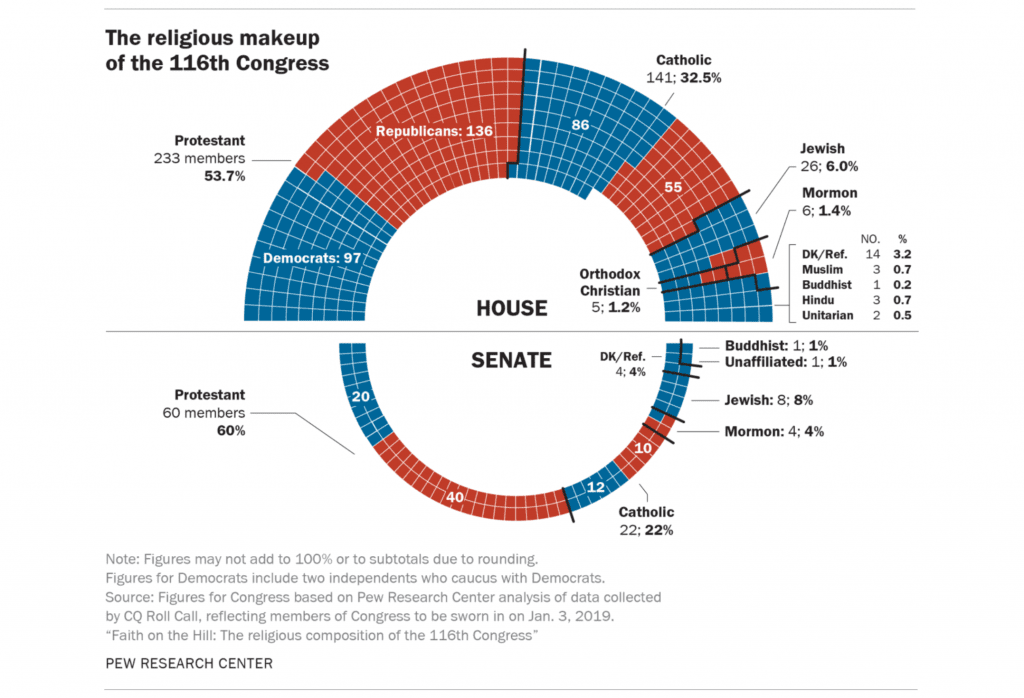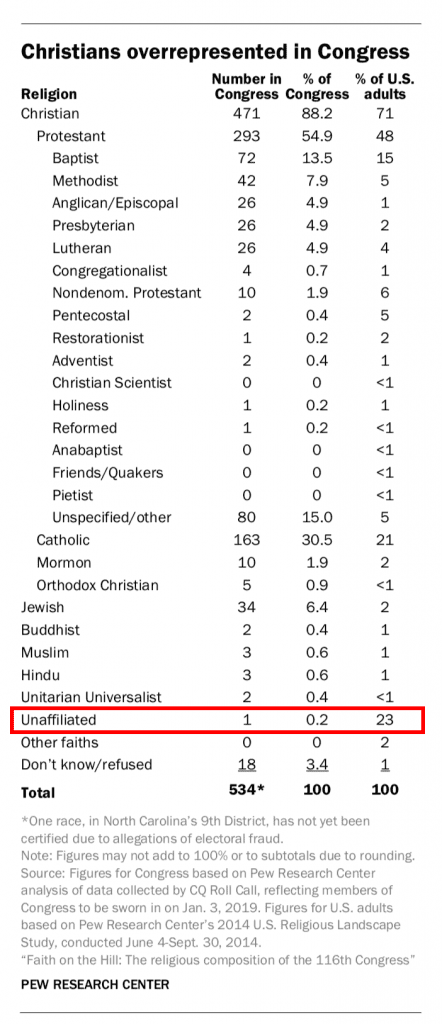When the new members of Congress take their oaths today, we will once again see a House and Senate completely devoid of open atheists… at least officially.
But wait! Isn’t Rep. Jared Huffman openly non-theistic? Doesn’t he call himself a “humanist”? Didn’t we make a big deal about that in 2017? Yes. Yes. Yes. However, according to the Pew Research Center, which reports on the religious makeup of Congress every two years and just released a new report today, Huffman “declined to state his religious identity in the CQ Roll Call questionnaire used to collect data for this report.” (Huffman! You had one job!)
With that in mind, here’s what we know about the religious affiliations of the 116th Congress.

It’s overwhelmingly Christian with a smattering of Jews, Muslims, Hindus, and followers of other faiths.
Yet, even though people without any organized religion represent 23% of the population, only 0.2% of Congress is “Unaffiliated.” And that lone member’s name is Sen. Kyrsten Sinema (D-AZ).

It’s tempting to give Sinema credit for being a “None,” but when asked if she was an atheist when she was first elected to Congress in 2012, her spokesperson dismissed the label by saying, “Kyrsten believes the terms non-theist, atheist or nonbeliever are not befitting of her life’s work or personal character.” So there’s that.
What about Jamie Raskin, the representative from Maryland? Wasn’t there a big kerfuffle about him not believing in God? Whatever he believes in private, he’s using the label “Jewish.” It may be a secular form of Judaism, but on paper, there’s no distinction. Former Rep. Barney Frank, after he left office, said that while he didn’t believe in God, he also didn’t like the word “atheist” as a descriptor for himself and never used it, in part, out of fear that the Jewish community would see him as anti-Semitic. Raskin said in 2017 that he was “one hundred percent Jewish,” “emphatically Jewish,” and that “I’ve never called myself an atheist.” (Ironically, none of that means he’s not an atheist.)
So, to summarize, we have one alleged atheist who says he’s Jewish, one self-described “Unaffiliated” congresswoman who thinks atheism is beneath her, one openly atheist legislator who didn’t answer the damn question, and a whole bunch of legislators who (I’m sure of it) are probably in the closet about their non-religiosity.
Republicans, of course, don’t even enter into this conversation.
That’s not to say nothing has changed. There are fewer Catholics (-5) and Mormons (-3) than two years ago, but 16 more Christians (overall) who don’t use a specific label. There are also now 18 members of Congress who chose not to answer the religion question — or just forgot to, Jared — up from 10 two years ago. And half of them are now women!
Those 18? (An asterisk denotes a newly elected member.)
Rep. Jared “I don’t respond to surveys” Huffman (D-CA)
Rep. Katie Hill (D-CA)*
Rep. Sean Casten (D-IL)*
Rep. Bill Foster (D-IL)
Rep. Sharice Davids (D-KS)*
Rep. Jared Golden (D-ME)*
Rep. Tom Malinowski (D-NJ)*
Rep. Antonio Delgado (D-NY)*
Rep. Suzanne Bonamici (D-OR)
Rep. Earl Blumenauer (D-OR)
Rep. Chrissy Houlahan (D-PA)*
Rep. Jennifer Wexton (D-VA)*
Rep. Pramila Jayapal (D-WA)
Rep. Mark Pocan (D-WI)
Sen. Michael Bennet (D-CO)
Sen. Tammy Duckworth (D-IL)
Sen. Tina Smith (D-MN)
Sen. Tammy Baldwin (D-WI)
(Way to represent, Illinois!)
Rep. Judy Chu (D-CA) was on this list last time, but she is now listed as a Unitarian Universalist. Also, Sen. Tina Smith is a new addition to the list, though she was in the last Congress (having replaced Sen. Al Franken).
Two other points of interest: Since 2016, we’ve seen the creation of the Congressional Freethought Caucus. It’s now up to 10 members. Of those ten, only Huffman, Pocan, and Jayapal are on the list above. The other members include two Jews, two Catholics, and a Buddhist (Rep. Hank Johnson of Georgia).
There are also fewer Protestants and fewer Christians overall in this Congress than ever before. It’s not quite a bright spot considering how much power they still wield… so let’s just call it a welcome dim spot.

Commenters will inevitably say this so I might as well echo my agreement: This is ultimately a superficial way of viewing the legislators. Everything I’m writing here is about symbolism — and there is a lot of importance in the idea of having an open atheist in public office. That would go a long way in decreasing the anti-atheist stigma that exists in our society.
At the same time, what really matters is how those legislators would vote on issues that matter to most of us. A Republican atheist who voted against women’s rights, LGBTQ rights, and church/state separation would be fighting against the wishes of most people who identify as non-religious. It wouldn’t be something to celebrate. And there are so many religious Democrats who do a wonderful job fighting for progressive causes. As long as they keep doing that, I don’t really care how they self-identify.
But still, it would be nice to have members of Congress — or how about just one for starters, Jared? — willing to admit they don’t buy into faith-based nonsense. (When it matters. Like when a group is taking a survey of the entire Congress. Which happens only once every two years.)
By the way, I’ve written versions of this post, in many parts word for word, over the past several years. That’s how little things have changed regarding the religious demographics in Congress when it comes to open atheists.




It’s Moving Day for the Friendly ..."
It’s Moving Day for the Friendly ..."
It’s Moving Day for the Friendly ..."
It’s Moving Day for the Friendly ..."